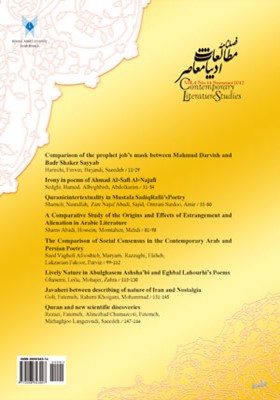-
-
List of Articles
-
Open Access Article
1 - Comparison of the prophet job’s mask between Mahmud Darvish and Badr Shaker Sayyab
firouz harirchi saeedeh birjandi -
Open Access Article
2 - Irony in poems of Ahmad Al-Safi Al-Najafi
hamed sadeghi abdolkarim alboghiyesh -
Open Access Article
3 - Quranicintertextuality in Mustafa SadiqRafii’sPoetry
nasro allah shameli sajed zare najaf abadi amir omrani sardo -
Open Access Article
4 - A Comparative Study of the Origins and Effects of Estrangement and Alienation in Arabic Literature
hosein shams abadi mehdi momtahen -
Open Access Article
5 - The Comparison of Social Consensus in the Contemporary Arab and Persian Poetry
maryam saed vaghefi elaheh razaghi parviz Lakzaeian Fakoor -
Open Access Article
6 - Lively Nature in Abulghasem Ashsha’bi and Eghbal
leila ghasemi haji abadi zahra mohajer noyi -
Open Access Article
7 - Javaheri between describing of nature of Iran and Nostalgia
fatemeh goli mohammad khoyghani -
Open Access Article
8 - Quran and new scientific discoveries
fatemeh rezayi fatemeh Alinezhad Chamazcoti saeedeh mir hagh jo langerodi
-
The rights to this website are owned by the Raimag Press Management System.
Copyright © 2021-2025







